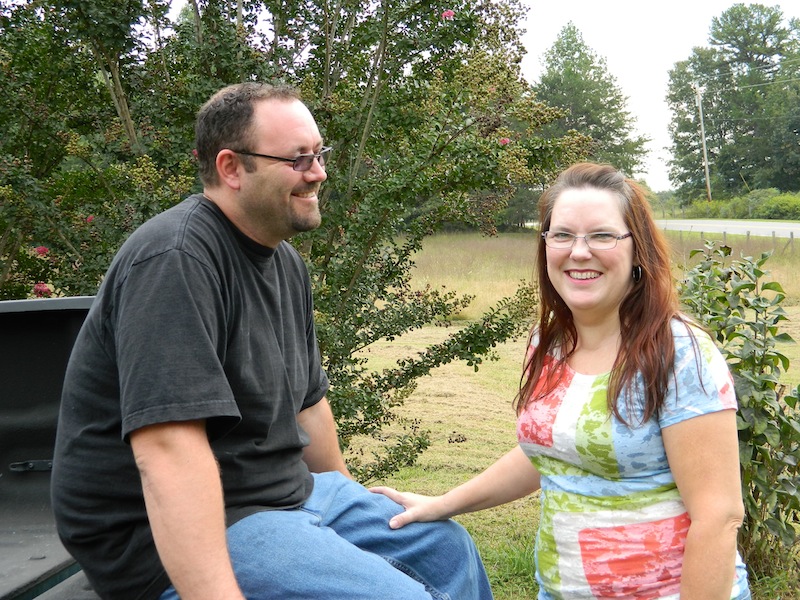“The quality of mercy is not strain’d,
It droppeth as the gentle rain from heaven.”
— The Merchant of Venice
Plenty of people would be happy to give their mother-in-law a piece of their mind, but how many would be willing to donate a portion of their own body?
Marianne Seaman Johnson, a 40-something Marion resident, says she never knew why her father called her “Mercy,” but it certainly seems fitting now. Her diabetic mother-in-law, 58-year-old Julia Godwin, had kidneys that were functioning at only 10 percent. Since May of last year, she’d been enduring painful, four-hour-long dialysis sessions three times a week. Godwin had been on a transplant waiting list for about a year and a half, but qualifying for a kidney can take years, and eventually, dialysis would no longer have worked. Meanwhile, none of the six family and friends tested proved to be a donor match. Some family members were automatically disqualified due to medical problems.
So in January, after conducting some Internet research, Johnson took the plunge, sending 15 vials of blood to Duke University Medical Center in Durham to be tested. Four of the six parameters tested matched — enough to qualify her as a donor.
“It’s the right thing to do, and I love her,” says Johnson. “I don’t want anything bad to happen to her, so if I’m the only one who can fix this, I’m going to. It’s not going to harm me.”
Be my Valentine
Johnson, who’s been Godwin’s daughter-in-law for six years, sees the situation as a gift that benefits the whole family.
“People have said, ‘Wow, you’re brave,’ but I don’t think of it that way … because I’m scared,” she confessed with a nervous laugh the night before the surgery. “Mostly, people are saying that’s a really nice gift to give, and everybody is telling Julia what a good daughter-in-law she has. A lot of people have said if it were them, they wouldn’t do it, and I was surprised.”
Johnson’s three kids, all in their 20s, gave her their approval, saying, “That’s cool,” and “That’s sweet, Mom.”
The next step was a battery of counseling and medical tests. Johnson had to talk to a clinical psychologist, a medical psychologist, a social worker and a donor advocate.
“Part of my counseling process included the fact that this might not work, and that Julia might have complications or, remotely, even death,” Johnson recalls. “I just felt confident about my decision and had faith that it would work, so I didn't let that information deter me.”
She also had to have an EKG, an ultrasound, a mammogram, a TB test, a chest X-ray and an MRI. Johnson viewed it all as a free physical, since Julia’s insurance would pay for the tests and the surgery; happily, she got a clean bill of health.
The best part, says Johnson, was that she didn’t tell anyone in the family she was doing all of this.
“It was Valentine’s Day, and both my mother- and father-in-law were in the car when I called them and told them to put me on speakerphone, because I had something I wanted to talk to them about. I made this long-drawn-out story about it. I said: ‘You know that little card you gave me with that number on it? Well, I sent my blood in.’ I just kept talking and talking, and my father-in-law finally jumped in and asked, ‘Are you telling us you’re a match?’ I said, ‘Yep.’ They were just so shocked, just tickled. They started crying.”
“I’m so grateful to her,” says Godwin. “She’s given me back my life. The Lord brought her into this family for a reason.”
The real deal
Doctors decided the left kidney would be the best fit. They told Johnson the four-hour surgery would entail three or four small puncture wounds and one 4-inch incision on her belly. They also said her body would function properly with one kidney and that it would grow larger, but she wouldn’t notice any changes. Johnson was told to expect two days in the hospital and six weeks out of work. After removing her kidney, it would be transferred to Godwin’s medical team in the next operating room.
The surgery took place Aug. 29 at Duke University Medical Center. Both women are doing well now, and Godwin is thankful to be done with dialysis. Johnson, who went in with a clean bill of health, had some complications during surgery resulting in an unexpected weeklong hospital stay.
And when Johnson was approached for this story concerning her generous donation, the unassuming Stein Mart assistant manager replied, “A story about what?”
“I made some deals with my husband,” she jokes. “Like he’s not allowed to win any arguments with me for the rest of his life. And he’s not allowed to leave me, either.”
— Freelance writer Carly Hart lives in Asheville.






So who is in the picture, Marianne or Julia?
Marianne, the donor.